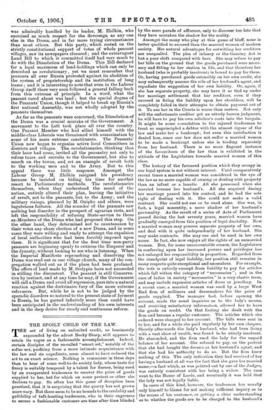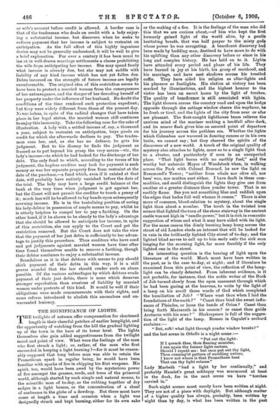THE SPOILT CHILD OF THE LAW. by the mere parade
of affluence, only to discover too late that they have mistaken the shadow for the reality.
Amongst the many who play at this game of bluff, none is better qualified to succeed than the married woman of modern society. Her natural advantages for outwitting her creditors are unequalled. The plea of infancy or the Gaming Act is but a poor shift compared with hers. She may refuse to pay her bills on the ground that the goods purchased were neces- sary and fitting to her station in life, and that therefore her husband (who is probably insolvent) is bound to pay for them. Or, having purchased goods ostensibly on her own credit, she may subsequently assume the role of her husband's agent, and repudiate the suggestion of her own liability. Or, again, if she has separate property, she may have it so tied up under her marriage settlement that her creditors, even if they succeed in fixing the liability upon her shoulders, will be completely foiled in their attempts to obtain payment out of it. To sue her in the Courts is worse than useless. Not only will the unfortunate creditor get an utterly barren judgment, he will have to pay his own solicitor's costs into the bargain. It might be some consolation to the injured tradesman to treat so unprincipled a debtor with the utmost rigour of the la* and make her a bankrupt; but even this satisfaction is denied him, since our law does not suffer a married woman to be made a bankrupt unless she is trading separately from her husband. There is no more flagrant instance of the favouritism of the law than is exhibited in the attitude of the Legislature towards married women of this class.
The history of the favoured position which they occupy in our legal system is not without interest. Until comparatively recent times a married woman was considered in the eye of the law as no more capable of owning or dealing with property than an infant or a lunatic. All she possessed when she married became her husband's. All she acquired during her marriage passed into his control, and he had the sole right of dealing with it. She could not make a valid contract. She could not sue or be sued alone. She was, in fact, a legal nonentity, a mere shadow of her husband's personality, As the result of a series of Acts of Parliament passed during the last seventy years, married women have gradually emerged from this position of legal disability. Now a married woman may possess separate property of her own, and, deal with it quite independently of her husband. She may make contracts. She may sue and be sued in her own name. In fact, she now enjoys all the rights of an unmarried woman. but, for some unaccountable reason, the Legislature in conferring upon her increased powers and privileges has not enlarged her responsibility in proportion. Regarded front the standpoint of legal liability, her position still remains in many respects quite exceptional and anomalous. For example, the wife is entirely exempt from liability to pay for articles which fall within the category of "necessaries "; and in the case of ladies in society " necessaries " is a very elastic term, and may include expensive articles of dress or jewellery. In a recent case, a married woman was sued by a large West End firm of milliners and dressmakers for the price of goods supplied. The manager had, before opening the account, made the usual inquiries as to the lady's means, and receiving satisfactory information, allowed her to have the goods on credit. On that footing she dealt with the 'firm and became a regular customer. The articles which she ordered were charged to her account. The bills were sent in to her, and for a while she paid regularly by her own cheques. Shortly afterwards the lady's husband, who had been living with a vast show of wealth, was found to be utterly insolvent. He absconded, and the firm sued the lady for the unpaid balance of her account. She refused to pay, on the pretext that she had bought the dresses as her husband's agent., and that She had his authority to do so. But the firm knew nothing of this. The only indication they had received of her having a husband at all was the fact that she gave her married name,—a fact which, as was pointed out by one of the Judges, was entirely consistent with her being a widow. The ,case went to the House of Lords, and eventually it was held that the lady was not legally liable.
In eases of this kind, however, the tradesman has usually only himself to blame for not making sufficient inquiry us to the means of his customer, or getting a clear understanding as to whether the goods are to be charged to the husband's
or wife's account before credit is allowed. A harder case is that of the tradesman who deals on credit with a lady enjoy- ing a substantial income, but discovers when he seeks to enforce payment that her income is subject to restraint on anticipation. As the full effect of this highly ingenious device may not be generally understood, it will be well to give a brief explanation. For over a century it has been usual to ins2rt in well-drawn marriage settlements a clause prohibiting the wife from anticipating her income. She may spend freely what income is already due, but she may not saddle with liability of any kind income which has not yet fallen due.
Debts incurred on the strength of future income are legally unenforceable. The original idea of this restriction seems to have been to protect a married woman from the consequences of her extravagance, and the danger of her denuding herself of her property under the influence of her husband. No doubt the conditions of the time rendered such protection expedient ; tut they were widely different from those of the present day. Ncver:heless, in spite of the radical changes that have taken place in her legal status, the married woman still continues to enjoy this immunity. Take the following case for the sake of illustration. A lady with a settled income of, say, a thousand a year, subject to restraint on anticipation, buys goods on credit for which she afterwards declines to pay. The trades- man sues her, and, as she has no defence, he gets his judgment. But to his dismay be finds the judgment so framed as to put beyond his grasp the very means—viz., the lady's income—to which be had looked for the discharge of her debt. The only fund to which, according to the terms of his judgment, the hapless creditor may look for payment is such money as was her separate property free from restraint at the date of the purchase,—a fund which, even if it existed at that date, will probably have entirely vanished before the date of the trial. The lady may have a large credit .balance at the bank at the very time when judgment is got against her, hut the Court will not permit the creditor to touch a penny of it; much less will he be allowed to lay bands upon subsequently accruing income. He is in the tantalising position of seeing his lady-debtor in possession of ample means to pay, whilst he is utterly helpless to compel her to pay a farthing. On the other hand, if it be shown to be clearly to the lady's advantage that she should be allowed to anticipate her income, in spite of this restriction, she can apply to the Court and get the restriction removed. But the Court does not take the view that the payment of her just debts is sufficiently to her advan- tage to justify this procedure. Thus creditors who have sued and got judgments against married women have time after time found themselves unable to recover a farthing, though their debtor continues to enjoy a substantial income.
Scandalous as it is that debtors with means to pay should shirk payment of their debts in this way, it is a still graver scandal that the law should render such an abuse possible. Of the various subterfuges by which debtors evade payment of their just debts, there is none which deserves stronger reprobation than evasions of liability by married women under pretexts of this kind. It would be well if their obligations were made commensurate with their rights, and some reform introduced to abolish this anomalous and un- warranted leniency.































































 Previous page
Previous page